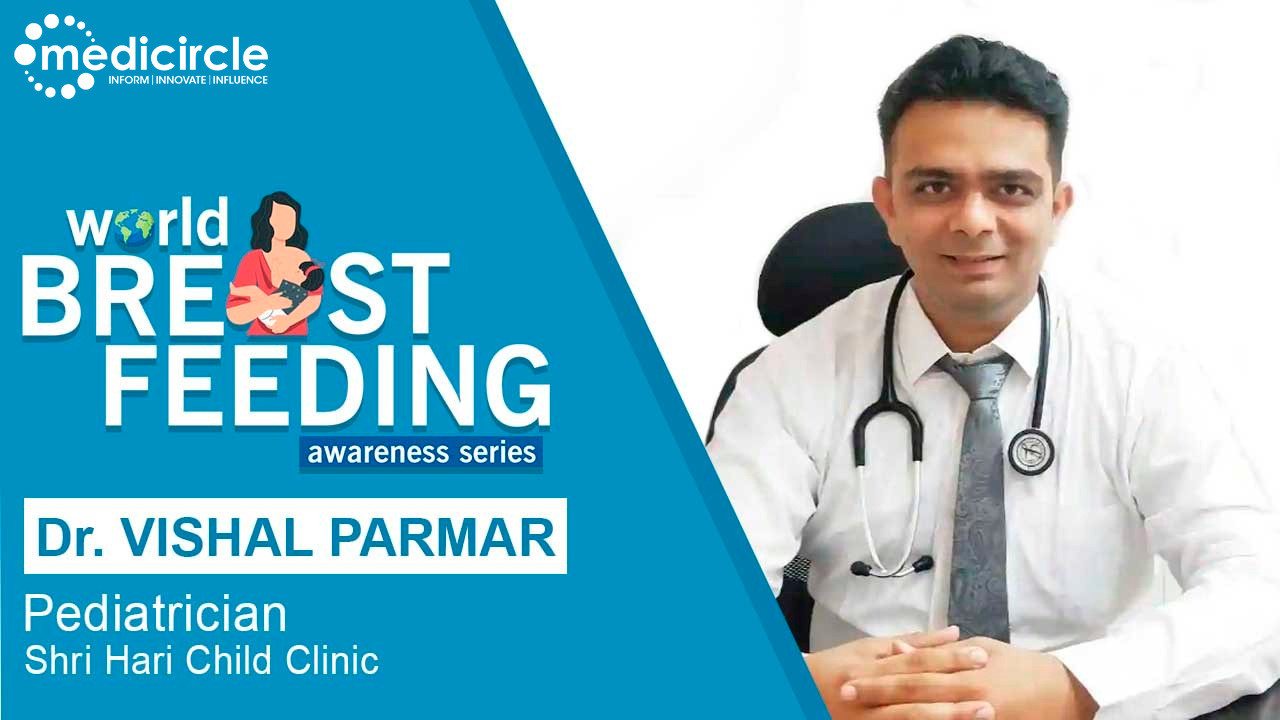August 1st till August 7th is observed as Breastfeeding Week. This week is celebrated to encourage mothers to breastfeed their newborns and to answer and solve the problems such mothers face while breastfeeding. Breastfeeding is known to be a very essential part of one’s life. Breast milk can reduce a child’s probability of getting asthma, allergies, diabetes, blood pressure, and some respiratory disorders. Children who receive breast milk are known to be more active and mentally sharp. It is not only the mother who has to hold the burden of breastfeeding but the entire family should provide a safe space for the mother to have quality time with the baby. World Breastfeeding Week’s theme in 2021 is “Protect Breastfeeding: A shared responsibility.” We at MediCircle, a healthcare media platform, talk and bring light to important healthcare topics and lend their solutions by talking to experts of the field.
Dr. Vishal Parmar is a Pediatrician specializing in Child Health from Mumbai, India. He has more than 7 years of experience in Pediatrics and Child health care, and his basic focus is on General paediatrics. He completed his MBBS at BJ Medical College, Ahmedabad, DCH at NHL MMC, Ahmedabad, and MRCPCH at Royal College of Pediatrics and Child Health, UK. Currently, he is practicing at Shri Hari Child Clinic, Mumbai, Maharashtra.
Breastfeeding benefits to Mother
He affirms, “It is equally beneficial to mothers as it is for the babies. A breastfeeding mother gets natural contraception in the initial months. It also helps mothers control their weight post-pregnancy. Breastfeeding also provides mothers with calm and satisfaction. Compared to bottle feeds, breastfeeding saves overall time while giving ample nutrients to the baby. Nature has a very unique way of producing such breast milk that takes into account the baby's health. Breastmilk nutrients compensate for any lack that the baby has.”
Diet for Breastfeeding mother
He says, “Breastfeeding mothers should continue eating our traditional food that includes coconut, methi, and other such ingredients. Our traditional diet comes in such a way that it increases the amount of lactation secretion. Mothers should try and maintain a good water intake. The more hydrated a mother stays along with spending more time with the baby and having a calm mind, the more breastmilk she will produce. The more the mother has love emotions because of the baby the more she will be able to breastfeed. It is also important that the family contributes and supports this endeavor.”
Mothers with pre-existing diseases
He tells, “Unless a mother has cancer or the baby is suffering from some disease, any mother with any disease can breastfeed the baby. The treatment and breastfeeding can be done simultaneously by the mother. There are very few medicines that will affect breast milk. If one still has doubt then they must visit their doctor. No routine disease will affect breastfeeding."
Breastfeeding and Covid
He clears the doubt by saying, “If the mother doesn’t have severe illness wherein she has to get hospitalized then she can breastfeed. Here the mother should wear a mask and follow proper Covid protocols. Neither is it recommended that any covid mother be separated from the baby. This is counterproductive as in many cases the baby is already exposed to the virus. In the end, unless your doctor tells you to stop breastfeeding you shouldn’t stop it.”
He adds, “It is important that the family supports the mother. Help the mother by giving her privacy during breastfeeding. After post-pregnancy, because of hormonal changes, there could be mood swings, so as such tolerate this and if needed take guidance from a psychologist. This is a very difficult time for the mother. A happy and comfortable mother will produce better milk which will help the baby grow properly. If the child will grow properly then he/she will contribute greatly to India’s economy. If you find any difficulty with breastfeeding then consult your doctor. There are many videos on YouTube that teach you the right techniques of breastfeeding.”
(Edited by Priyal Shah)
Contributed by: Dr. Vishal Parmar, Shri Hari Child Clinic

 Dr Parmar tackles the challenge of breastfeeding right from its benefits to mothers to the precaution that Covid infected mothers should take. He suggests the diet breastfeeding mother should take and encourages the family mothers to support and help mothers.
Dr Parmar tackles the challenge of breastfeeding right from its benefits to mothers to the precaution that Covid infected mothers should take. He suggests the diet breastfeeding mother should take and encourages the family mothers to support and help mothers.







.jpeg)


.jpg)








.jpeg)

.jpg)




.jpg)




.png)


